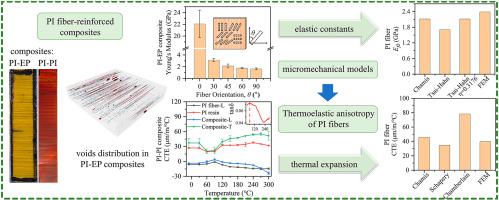当前位置:
X-MOL 学术
›
Compos. Sci. Technol.
›
论文详情
Our official English website, www.x-mol.net, welcomes your feedback! (Note: you will need to create a separate account there.)
Estimation of transverse thermoelastic properties of polyimide fibers based on micromechanical models
Composites Science and Technology ( IF 9.1 ) Pub Date : 2024-03-10 , DOI: 10.1016/j.compscitech.2024.110541 Cheng Lu , Huiqi Shao , Siyi Bi , Nanliang Chen , Guangwei Shao , Jinhua Jiang
Composites Science and Technology ( IF 9.1 ) Pub Date : 2024-03-10 , DOI: 10.1016/j.compscitech.2024.110541 Cheng Lu , Huiqi Shao , Siyi Bi , Nanliang Chen , Guangwei Shao , Jinhua Jiang

|
The determination of the thermoelastic properties of polyimide (PI) fibers is important for their applications, however, these properties are difficult to measure directly, especially the transverse thermoelastic properties. Here, the transverse thermoelastic properties of PI fibers, including transverse Young's modulus (2.12 GPa), shear modulus (0.94 GPa), Poisson's ratio (0.05), and coefficient of thermal expansion (45.68 μm/m°C), were estimated by combining dynamic and static thermo-mechanical techniques, as well as various relevant micromechanical models. The transverse Young's modulus of PI fibers was only 1/46th of the longitudinal one, and the transverse coefficient of thermal expansion of PI fibers was positive, unlike the longitudinal one, which was negative, showing the typical anisotropy of PI fibers. Finally, the thermoelastic properties of the PI fibers were in turn used to predict the thermoelastic behavior of the PI fiber-reinforced composites, thus validating their effectiveness.
中文翻译:

基于微力学模型估计聚酰亚胺纤维的横向热弹性性能
聚酰亚胺(PI)纤维的热弹性性能的测定对其应用很重要,然而,这些性能很难直接测量,特别是横向热弹性性能。这里,PI纤维的横向热弹性性能,包括横向杨氏模量(2.12 GPa)、剪切模量(0.94 GPa)、泊松比(0.05)和热膨胀系数(45.68 μm/m°C),通过结合动态和静态热机械技术,以及各种相关的微机械模型。 PI纤维的横向杨氏模量仅为纵向杨氏模量的1/46,并且PI纤维的横向热膨胀系数为正,而纵向热膨胀系数为负,表现出PI纤维典型的各向异性。最后,PI纤维的热弹性性能又被用来预测PI纤维增强复合材料的热弹性行为,从而验证其有效性。
更新日期:2024-03-10
中文翻译:

基于微力学模型估计聚酰亚胺纤维的横向热弹性性能
聚酰亚胺(PI)纤维的热弹性性能的测定对其应用很重要,然而,这些性能很难直接测量,特别是横向热弹性性能。这里,PI纤维的横向热弹性性能,包括横向杨氏模量(2.12 GPa)、剪切模量(0.94 GPa)、泊松比(0.05)和热膨胀系数(45.68 μm/m°C),通过结合动态和静态热机械技术,以及各种相关的微机械模型。 PI纤维的横向杨氏模量仅为纵向杨氏模量的1/46,并且PI纤维的横向热膨胀系数为正,而纵向热膨胀系数为负,表现出PI纤维典型的各向异性。最后,PI纤维的热弹性性能又被用来预测PI纤维增强复合材料的热弹性行为,从而验证其有效性。



























 京公网安备 11010802027423号
京公网安备 11010802027423号